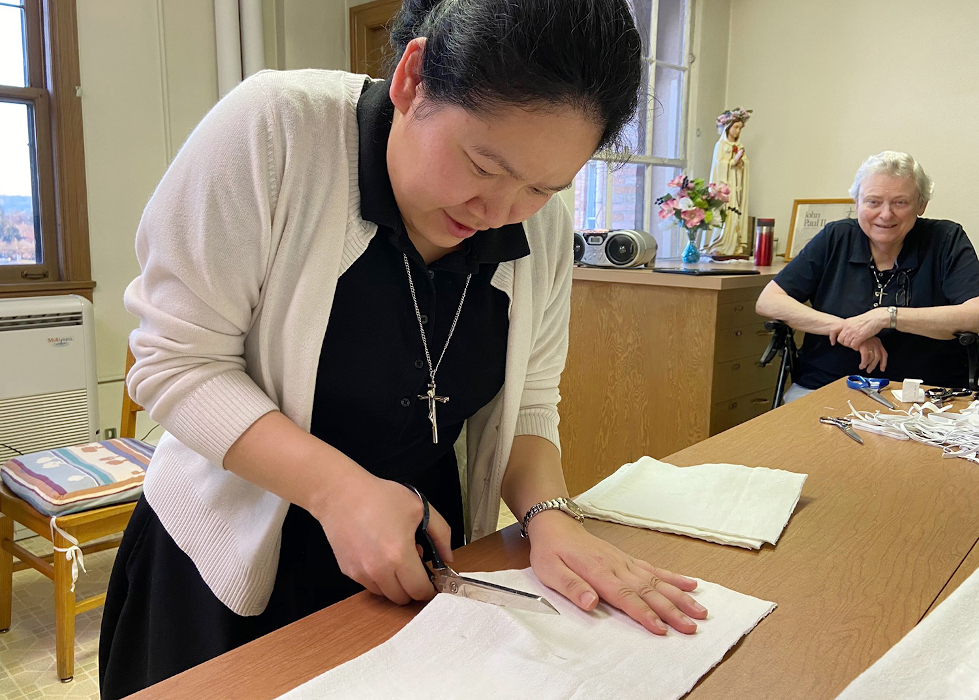
Kieu Tran, a candidate for the Sisters of St. Mary of Oregon, cuts fabric for coronavirus masks in Beaverton, Ore., March 20, 2020. The sisters are making hundreds of masks for Maryville, a nursing facility that is a short walk from the sisters' motherhouse. Also pictured is Sister Marcella Parrish. (CNS/courtesy Sr. Krista von Borstel, Sisters of St. Mary of Oregon)
Mary Garcia, supervisor for environmental services at Maryville, a Beaverton care facility, saw the warning signs of the coronavirus pandemic — and potential shortages of personal protective equipment — hitting close to home before most saw it.
"Her wonderful idea came more than a month ago," said Sr. Josephine Pelster, a Sister of St. Mary of Oregon, who is director of pastoral care at Maryville.
Garcia began experimenting with making cloth face masks. She tried different patterns, purchased four bolts of material and then began handing it out to cutters and seamstresses, first of all the sisters. Kathleen Parry, Maryville's administrator, and John Matcovich, president of the Valley Catholic school system, made sure that parents of Valley Catholic Early Learning, Grade School, Middle School and High School also were invited to sew masks.
Maryville is on the Sisters of St. Mary of Oregon's Beaverton campus, which also includes their motherhouse and the schools.
Sr. Denise Klaas, chair of the sewing committee at the motherhouse, sounded apologetic that the sewing request had come at the same time as the order's annual chapter meeting. That meant the sisters weren't immediately able to sew as many as they would have liked.
Still, their assembly line was able to produce 100 washable masks that the staff at Maryville began using right away.
"We're just getting started," Klaas told the Catholic Sentinel, newspaper of the Portland Archdiocese. "Once you get going with the pattern, you can whip them out."
Pelster 's view differed slightly. "They're pleated, and getting the needle through the pleats was a challenge," she said.
Even so, she was pleased with her effort. "The one I made is tidy."
As March 31, all of Maryville's staff, whether they're in the hallways or with a resident, are required to wear a face mask.
The rule of wearing a face mask all the time may be an example of Maryville once again nimbly landing ahead of the curve of general knowledge.
While in late February and early March, U.S. Surgeon General Jerome Adams and the head of the Centers for Disease Control were definitively telling Americans that face masks were not effective in preventing the spread of the deadly COVID-19, today the message is different.
On March 30, Robert Redfield, director of the CDC, told National Public Radio his agency was reviewing its face mask guidelines and may recommend the general public wear them.
On April 2, Adams and other top federal officials said Americans should wear masks for some protection when grocery shopping, for example, and in those cases where they are unable to distance themselves from others by the recommended 6 feet. Adams said N95 masks need to be preserved for use by professionals but recommended ways people could make a simple face mask.
Several studies seem to indicate that wearing a face mask decreases the spread of illness.
That's never been more important, especially in a care facility. Around the world, such facilities are doing everything possible to keep the virus from gaining a foothold and hurting their residents, as happened at the first outbreak of COVID-19 in the United States, at Life Care Center in Kirkland, Washington, just outside Seattle.
Pelster thought that the current norms at Maryville — regretfully banning both volunteers and visiting families — are in force at every facility across the state. "We have to put in the extra precautions to protect our residents," she said, adding that family members are talking with their loved ones from outside, through the windows.
She's been impressed by all the face masks. "It's amazing how many talented people are in our community — and beyond, in society," she said.
"The response was overwhelming," Garcia wrote in an email.
Klaas expected the sisters would soon have 500 masks made.
"It feels good to be able to do something to help," she said. "We're just getting started."
Garcia has the next project already in mind for the sisters and other volunteers.
She said she is working hard to complete the kits for scrub gowns, another protective measure. "We have material for more than 300 of them," she wrote to her volunteers. "Be patient with me."
Advertisement




